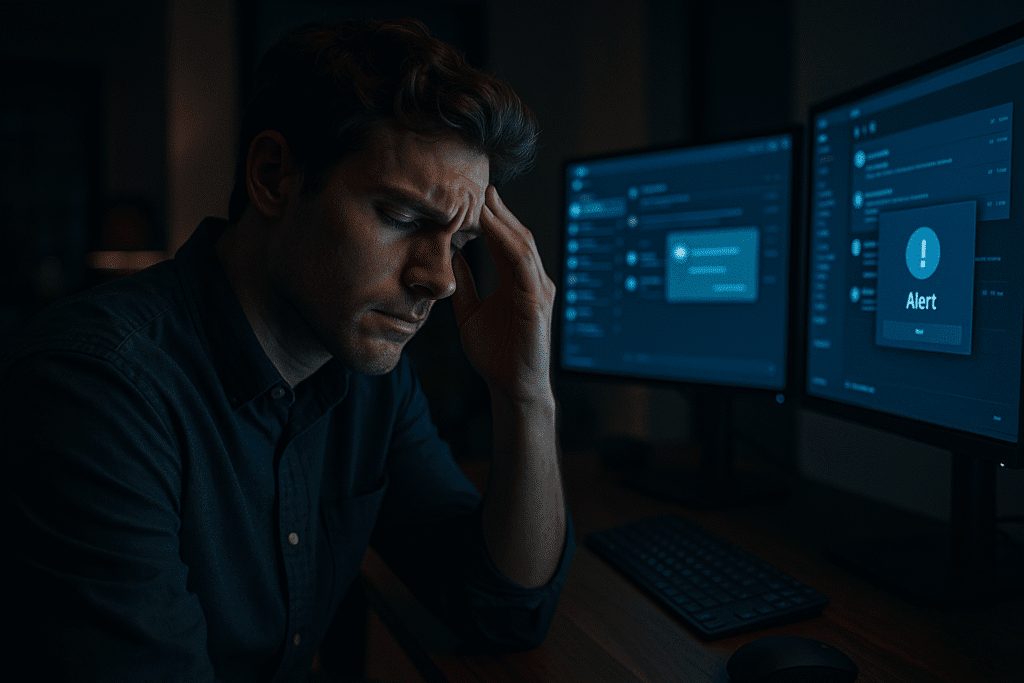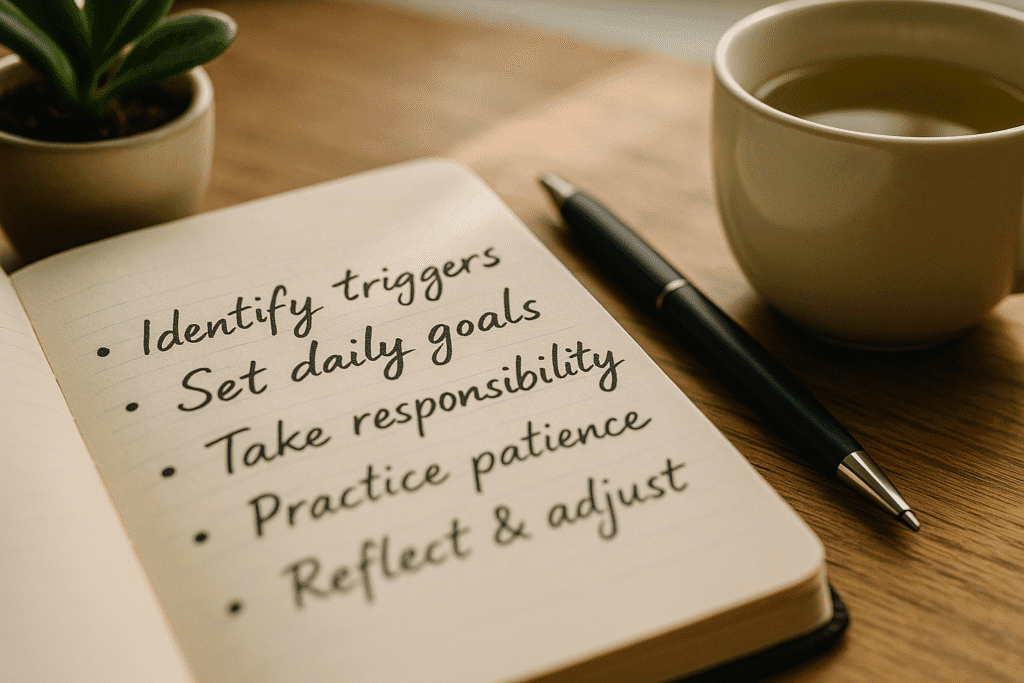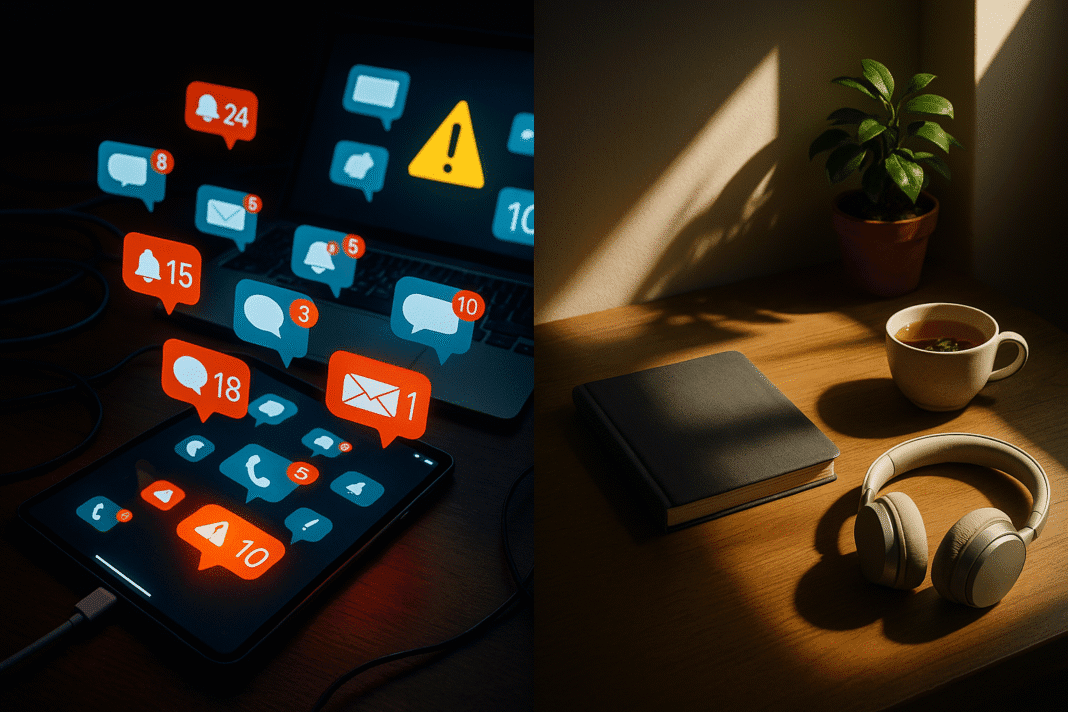In our digital age, screens dominate our lives. Notifications constantly demand our attention. This relentless digital noise leads to mental fatigue and anxiety.
Information overload is now a common struggle. It quietly erodes our focus and emotional balance. Sleep quality suffers as well. Mental fatigue solutions are more crucial than ever. We need effective strategies to combat this modern challenge. Our minds deserve a break from the chaos. Understanding mental fatigue is the first step. Recognizing its causes and symptoms is essential. Only then can we address the issue effectively.
This guide offers practical solutions. It aims to boost mental energy and enhance wellness. Discover how to reclaim your focus and balance. Join us as we explore fatigue management tips. Learn to navigate the digital world with ease. Your mental well-being is worth the effort.
Understanding Mental Fatigue: Causes and Symptoms

Mental fatigue arises from prolonged mental activity. Constant focus on screens intensifies the strain. Our brains become overworked and depleted. Daily routines filled with multitasking contribute significantly. Tasks demand our mental resources relentlessly. Fatigue sets in from this continuous strain.
Symptoms of mental fatigue vary. They include:
- Difficulty concentrating
- Irritability
- Decreased productivity
Recognizing these signs early is crucial. They indicate when our mental stamina is waning. Taking action can prevent further decline. Understanding the underlying causes helps in managing fatigue. It’s not just about tiredness; it’s about mental drain. This awareness empowers us to seek solutions.
Mental fatigue impacts daily life in subtle ways. Our emotional balance can wobble. Even simple tasks feel daunting when fatigued.Learning about these symptoms and causes is the starting point. It lays the groundwork for effective interventions. We can then tailor strategies to combat the fatigue effectively.
The Impact of Digital Overload on Mental Wellness
Digital overload has become unavoidable. Every ping, alert, and screen glare takes a toll. Our minds are constantly bombarded with information. The brain struggles to filter this relentless data. It leads to cognitive clutter. This clutter diminishes our focus and clarity. Effects of digital overload include:
- Increased anxiety
- Poor sleep quality
- Reduced attention span
These effects accumulate over time. They erode our mental wellness subtly, yet significantly. Our resilience decreases with each digital interaction. Managing this influx is crucial. Setting limits helps regain control. A more mindful approach to technology can restore balance. By actively managing screen time, we can counteract digital overwhelm, enhancing mental clarity and emotional health. Recognizing the overwhelming impact of constant connectivity allows us to make healthier choices.
Recognizing the Warning Signs: When to Take Action

Mental fatigue can sneak up on us. It manifests subtly, making it essential to recognize the signs early. A proactive approach prevents it from worsening. Beware of common symptoms. They often begin with feeling irritable. Concentration may suffer too, making tasks seem daunting. Listen to your body and mind. Key warning signs include:
- Persistent mental fog
- Increased forgetfulness
- Persistent lack of motivation
If you notice these signals, take action. Ignoring them can lead to burnout. Consider implementing immediate strategies to manage these symptoms. Recognizing them early can make a huge difference in maintaining your mental health and overall well-being. Taking decisive steps to address these signs fosters resilience and ensures your mental wellness remains intact.
Fatigue Management Tips for Everyday Life
Managing mental fatigue requires practical strategies. Simple adjustments can make everyday life more manageable. Prioritizing rest and productivity is key. Begin with consistent breaks. Short intervals refresh the mind. For example, try the Pomodoro Technique: work for 25 minutes, then rest for 5. Stay organized with to-do lists. They simplify tasks and reduce overwhelm. Checking off completed items boosts motivation. Additionally, incorporate these tips:
- Stay hydrated
- Limit caffeine intake
- Eat balanced meals regularly

Physical activity can also uplift mental energy. Even a short walk can clear the mind. Choose activities that you enjoy and can sustain. Explore hobbies and creative outlets. These add fun and reduce stress. Whether painting or playing an instrument, engage in activities that fulfill you. Creating a peaceful workspace supports focus. A clutter-free environment enhances efficiency. Consider ergonomic furniture to minimize physical stress.
Remember that building a support network is important too. Surrounding yourself with positive influences helps navigate stress. Reach out when needed. Implement these tips gradually. Adapt them to fit your lifestyle. This approach builds resilience against mental fatigue in daily life.
Boost Mental Energy: Science-Backed Strategies
Boosting mental energy involves adopting science-backed strategies that rejuvenate the mind. Unlike physical energy, mental vitality requires unique approaches. Understanding how the brain functions helps in energizing it. Engage in regular cognitive exercises. Puzzles and brain games can stimulate neural connections. Nutrition plays a significant role. Certain foods are known to enhance brain function. Incorporate these into your diet:
- Walnuts and almonds
- Blueberries and oranges
- Spinach and avocados
Additionally, staying hydrated supports mental alertness. Water is crucial for optimal brain performance. Aim to drink several glasses daily.

Another effective strategy involves managing stress through mindfulness practices. Mindfulness quiets the mind, reducing mental strain. This, in turn, can boost clarity and focus.Regular sleep patterns also ensure energy levels are maintained. The brain repairs itself during sleep, consolidating memory and sharpening attention. Physical activity shouldn’t be overlooked. It releases endorphins, enhancing mood. Consider these activities for their brain-boosting benefits:
- Brisk walking or running
- Yoga or tai chi
- Dancing or swimming
Integrating these evidence-based methods into your routine revitalizes mental stamina. Choose strategies that resonate with you, creating a balanced, energized mindset.
Mental Wellness Strategies for the Digital Age

In our digital era, maintaining mental wellness requires strategic actions. The allure of constant connectivity can overwhelm the mind. Taking steps to reclaim balance is crucial. A practical strategy is to schedule regular digital detoxes. Allocate specific times daily or weekly without screens. This break can help reset mental focus.
Engage in activities that nourish the soul. Hobbies such as painting, gardening, or playing an instrument encourage creativity and relaxation. Such activities combat stress and enhance joy. Social connections also play a significant role. Face-to-face interactions foster emotional support. Prioritize meetings with friends and family in person.
Practicing gratitude can shift your mindset positively. Regularly jot down things you are thankful for. This simple action improves outlook and emotional resilience. Consider incorporating structured time management techniques. The Pomodoro Technique, which involves working in focused intervals, increases productivity. This method prevents burnout by promoting frequent breaks.
Combining these strategies supports mental wellness. Select those that suit your lifestyle best, creating a personalized approach.
The Power of Sleep: Restoring Your Mind and Body

Quality sleep is essential for mental and physical restoration. It acts as a natural remedy for tired minds. Sufficient rest enhances focus, mood, and overall health. Establishing a consistent sleep routine is crucial. Going to bed and waking up at the same time daily promotes better sleep patterns. Consistency helps regulate your body’s internal clock.
Create a sleep-friendly environment by minimizing light and noise. Invest in a comfortable mattress and pillow. These changes make drifting off easier. Avoid screens before bedtime to prepare your mind for rest. Blue light from devices disrupts the production of sleep-inducing hormones. Instead, try reading a physical book.
Incorporating relaxation techniques before bed can improve sleep quality. Consider activities like meditation or deep breathing exercises. These practices can calm your mind, facilitating better sleep.
Tips for Better Sleep:
- Stick to a regular sleep schedule.
- Limit caffeine intake in the afternoon.
- Engage in relaxing activities before bed.
Nutrition and Hydration: Fueling Cognitive Health

A balanced diet plays a critical role in cognitive function. Consuming nutritious foods can enhance mental clarity. Omega-3 fatty acids, found in fish, are particularly beneficial. Antioxidants and vitamins also support brain health. Berries, nuts, and leafy greens are excellent sources. These nutrients combat oxidative stress, protecting your brain.
Staying hydrated is equally important for mental alertness. Dehydration can lead to fatigue and impaired concentration. Drink water regularly to maintain energy levels throughout the day. Limiting sugar and processed foods can boost your mental performance. These foods often cause energy spikes and crashes. Opt for whole grains and lean proteins instead.
Incorporate a variety of foods for balanced nutrition. This approach ensures you’re getting all essential nutrients. Eating mindfully can improve both mood and focus.
Foods for Cognitive Health:
- Fatty fish for omega-3s
- Berries for antioxidants
- Nuts for healthy fats
Exercise and Movement: Physical Solutions for Mental Fatigue

Regular physical activity is a powerful antidote to mental fatigue. Exercise increases blood flow to the brain, enhancing cognitive functions and alertness. Even short bursts of movement can make a difference.
Aerobic exercises like walking, cycling, or swimming are particularly effective. These activities stimulate the production of endorphins, chemicals that improve mood and reduce stress. Aim for 30 minutes of moderate exercise most days.
Incorporate movement into your daily routine to combat fatigue. Take the stairs, stretch at your desk, or enjoy a brisk walk during lunch. Small changes add up over time.
Physical activities can also improve sleep quality. Better sleep leads to greater energy and focus the following day. Making time for exercise can thus yield multifaceted benefits.
Remember, the best exercise is one you enjoy. Consistency is key to reaping long-term advantages.
Types of Beneficial Exercise:
- Walking or running
- Cycling or swimming
- Dancing or yoga
Mindfulness, Meditation, and Stress Reduction Techniques

Mindfulness practice is a potent tool for managing mental fatigue. It involves being fully present in the moment, reducing anxiety. Meditation helps calm the mind, bringing clarity and focus. Even five minutes of daily meditation can significantly lower stress levels.
Consider practicing deep breathing exercises. Simple techniques like inhaling slowly and deeply can bring immediate relaxation. Integrating mindfulness into daily activities is beneficial. Focus on each task, whether eating or walking, to cultivate peace. Explore various stress-reduction methods to find what works for you. Incorporating them into your routine creates resilience against mental exhaustion.
Simple Mindfulness Practices:
- Deep breathing exercises
- Daily meditation sessions
- Mindful eating and walking
Setting Boundaries: Digital Detox and Screen Management

In today’s world, screens are unavoidable, yet they can drain mental energy. Implementing screen boundaries is crucial for maintaining mental wellness. A digital detox offers relief from constant connectivity. Start small with an hour of screen-free time each day to recharge your mind.
Limiting notifications can greatly reduce distractions. Consider turning off non-essential alerts to regain focus and control over your time. Establishing tech-free zones in your home can encourage balanced screen usage. Designate areas for relaxation without digital devices.
Steps for Digital Detox:
- Initiate daily screen-free time
- Disable unnecessary notifications
- Create tech-free home zones
Building Emotional Resilience and Support Networks

Emotional resilience helps you manage stress effectively. Developing this skill is key in combatting mental fatigue. Support networks play a vital role in mental wellness. Close connections offer understanding and encouragement during tough times. Engage in regular interactions with friends or family. These relationships provide emotional nourishment and help maintain balance. Joining groups with shared interests fosters community. Such connections boost your resilience and provide a sense of belonging.
Ways to Build Emotional Support:
- Strengthen family bonds
- Expand social circles
- Join interest-based groups
When to Seek Professional Help: Knowing Your Limits

Understanding when to seek expert help is vital. Chronic mental fatigue can affect your quality of life and functionality. Persistent symptoms may signal a deeper issue. Consulting a mental health professional can provide needed support and guidance. Consider professional assistance if self-care methods fail. Therapy may offer strategies personalized to tackle fatigue effectively.
Indicators for Professional Help:
- Prolonged mental exhaustion
- Difficulty managing daily tasks
- Persistent stress and anxiety
Conclusion: Creating Your Personalized Mental Fatigue Solution Plan

Combating mental fatigue requires a tailored plan. Implementing strategies that suit your lifestyle is key to success. Explore various mental fatigue solutions to find what resonates. Incorporate small changes for lasting effects. Stay flexible and adjust your approach over time. Your mental wellness journey is unique and evolving.
Read More Here in Future: Identify personal fatigue triggers, Set achievable, realistic goals, Regularly review and revise strategies




